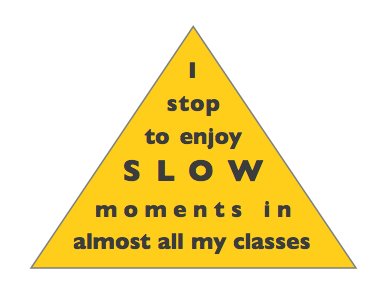 Lesson Planning As Process
Lesson Planning As Process
– Cecilia Lemos
My lesson plans – and the concrete results of my lesson planning – have changed greatly over the many years I have been teaching and they continue to change every semester. They change because me, my students, my students’ needs, my needs, and the tools I work with have changed. It would be foolish if my planning didn’t change as well. It’s an evolutionary process that I explore in some depth HERE.
When we are new to teaching, a detailed lesson plan is essential because it gives us confidence. By thinking of all the steps, all the procedures, all the materials needed, all the types of interactions that might take place along with predicting the time each activity will last, we get the feeling of being ready for the lesson. By thoroughly planning a lesson, we reduce the chances of being caught off-guard — something that can be very frustrating to any teacher, but that can be especially difficult to those new to the job. No matter how long we’ve been teaching, though, it’s always important to ask ourselves questions like these as we plan and reflect and work to plan a lesson:
What will my students have learned after this lesson is over?
What will they be able to do by the end of it that they weren’t able to do before?
How will this lesson help them progress in their learning?
(and most importantly)
How will I help them get there?
When planning lessons, besides considering what I will talk about, how I will talk about it and what materials I will use as I talk about it, I try to predict possible difficulties and questions the students might have so I can be ready to address those. This helps me fit the lesson within the bigger picture of the term and the content I am supposed to cover. I reflect on the balance between types of activities and types of learners. That always makes me calmer before teaching. More than planned, I am prepared.
That brings me to what I truly believe is the heart of lesson planning: not the printed – or in my case, the handwritten – plan itself, but all the thinking behind it as I consider the groups I’ll be teaching and their individual and collective needs.
Nowadays, my physical lesson plan consists only of bullet points – key words, book pages, links or worksheets. That is the result of nearly 20 years of teaching. The fact that my lesson plan can fit on one side of an index card does not mean it is somehow been reduced to that. There is a lot behind those words on my index cards, but all that’s in my head. I don’t have to write the procedures for each activity because I have done them so many times I know them by heart. On the other hand, when it is a new activity or tool, I do write the procedures out, just to have something to rely on if my memory fails me.
I have also used lesson planning to work on my own specific problem areas that either I have noticed myself or that have been pointed out to me after an observation. For instance, once I got feedback that my instructions were long and confusing. What did I do?
For a while after that, when planning I would think of the words I would use to give instructions for the activities I had planned and write them down. Seeing the instructions I wanted to give written down helped because I could reflect on their effectiveness and edit them as needed so that they became more clear and concise. Having the instructions written out before actually giving them and that process I went through as I worked on them made me a better teacher — I hope!
That is what lesson planning is really all about. It’s not about having planned, but rather about being prepared, staying on top of things, and getting better in the process.
Connect with Cecilia, John, Marco, Steven, Alexandra, James and other iTDi Associates, Mentors, and Faculty by joining iTDi Community. Sign Up For A Free iTDi Account to create your profile and get immediate access to our social forums and trial lessons from our English For Teachers and Teacher Development courses.







